
Meridian Mnemonics
Health Preservation

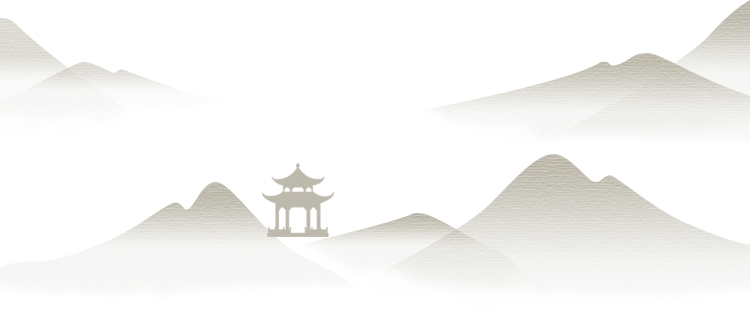

Preserve
Health
Nourish
Life

“The meridians determine life and death, manage hundreds of diseases, and regulate deficiency and excess; they must remain unobstructed!”
In TCM health preservation, the most important thing is not just to learn moxibustion, but to understand your own meridian acupoints. If an organ is uncomfortable, stimulating the related meridian acupoint will bring relief. If a certain area hurts, it is definitely due to stagnation in the meridian acupoint of that area; you can press, tap, or use moxibustion until the pain subsides! 

Quick Mnemonics for Meridians
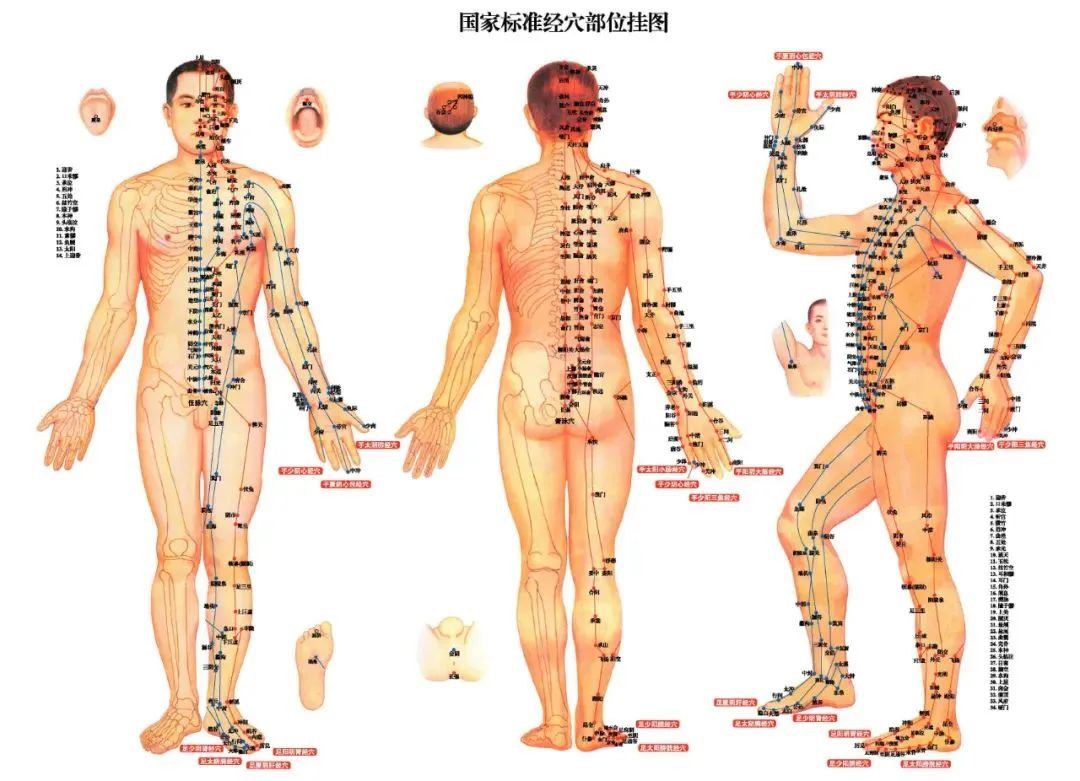
1. Ren Mai (Ren Meridian) is located at the front of the chest; if the heart and spleen-stomach are obstructed, it connects the breast to the uterus, and if obstructed, one may age prematurely.
2. Du Mai (Governing Meridian) runs along the spine; it supervises the flow of Qi and blood; the five zang and six fu organs correspond to the Du Mai, and pain in the corresponding areas indicates obstruction.
3. Gallbladder Meridian runs along the pants line; if secretion is disordered, it can affect the nerves; symptoms include drowsiness, sweating, fatigue, swelling in the armpits, and headaches; lymph inflammation can cause localized swelling, and visual disturbances may occur.
4. Liver Meridian corresponds to the Gallbladder Meridian; it regulates circulation and secretion; symptoms include bluish skin, waist pain, dark circles under the eyes, and dysmenorrhea; dry eyes and excessive eye discharge indicate excessive liver fire.
5. The Kidney Meridian is located behind the Liver Meridian, not far apart; it regulates the secretion system; symptoms include scanty urination and frequent urination; bags under the eyes, wrinkles, cold feet, and lower limb swelling indicate kidney deficiency; premenstrual waist and back pain, facial spots, and anxiety; memory decline and insomnia indicate obstruction.
6. The Kidney Meridian corresponds to the Bladder Meridian; it regulates urination and the skeletal system; symptoms include yellow urine and bladder pain, urinary tract infections, weakness in the limbs, back pain, and hemorrhoids.
7. The Stomach Meridian is located in front of the Gallbladder Meridian; symptoms include oral ulcers, toothache, dry mouth, bad breath, and abdominal pain; heat in the body leads to belching and a preference for cold food; constipation and dry stools are common.
8. The Stomach Meridian corresponds to the Spleen Meridian; it regulates immunity and the nervous system; symptoms include bloating, belching, nausea, and rib pain; varicose veins and low blood pressure, as well as rheumatism and joint pain.
9. The Large Intestine Meridian runs from the index finger to the armpit; it is a Yang meridian; it regulates digestion and the nervous system; symptoms include abdominal bloating, dry mouth, neck pain, and heat in the body; hemorrhoids and headaches may occur.
10. The Lung Meridian runs from the chest to the thumb; it is a Yin meridian; it regulates respiration and immunity; symptoms include dehydration, nasal congestion, heat in the body, sweating, back acne, and throat pain; colds and chills may occur.
11. The Heart Meridian runs from the heart to the little finger; it is a Yin meridian; it regulates the circulatory system; symptoms include chest tightness and headaches; irritability, insomnia, and frequent dreams; pain in the shoulders and chest; red eyes, dry mouth, and poor blood circulation indicate stress.
12. The Small Intestine Meridian runs from the little finger to the shoulder; it is a Yang meridian; it regulates digestion and the nervous system; symptoms include pain in the temples, abdominal bloating, and headaches; back pain may occur.
13. The Pericardium Meridian runs from the chest to the middle finger; it is a Yin meridian; it regulates secretion and circulation; symptoms include poor circulation and rapid heartbeat; irritability and red eyes may occur.
14. The San Jiao Meridian runs from the ring finger to the shoulder; it is a Yang meridian; it regulates secretion and circulation; symptoms include decreased immunity and depression; fatigue and chronic illness may occur.



Summary of the Twelve Meridians
01
[Hand Taiyin Lung Meridian]
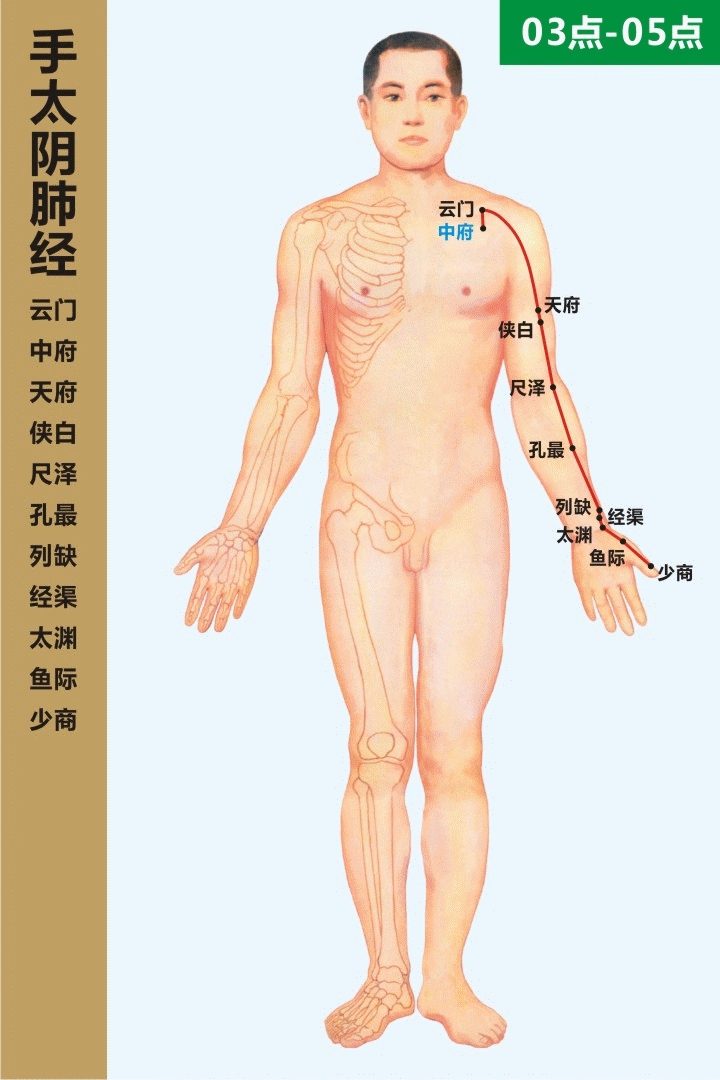
Yin time (3 AM to 5 AM) — Lung Meridian is strong. During this time, if one sleeps soundly, the complexion is red and energy is abundant; “the lungs govern the hundred vessels.” The liver pushes fresh blood to the lungs after the previous cycle, providing fresh blood to the lungs to distribute throughout the body. Therefore, in the morning, a person’s complexion is rosy and energy is abundant. Those with lung diseases often feel the strongest symptoms at this time, such as severe coughing or asthma.
Excess symptoms: Abdominal bloating, constipation, hemorrhoids, discomfort or pain in the shoulders and back, toothache, skin abnormalities, and upper abdominal issues.

02
[Hand Yangming Large Intestine Meridian]
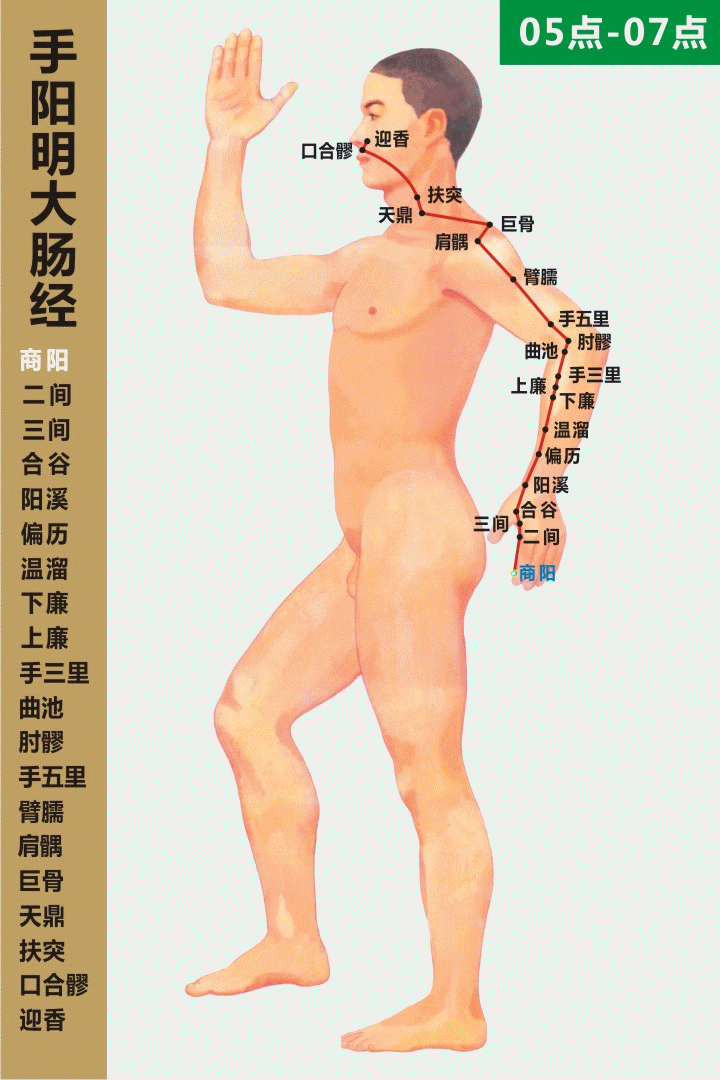
Yin time (5 AM to 7 AM) — Large Intestine Meridian is strong. During this time, the large intestine peristalsis occurs, expelling toxins; “the lungs and large intestine are interrelated.” The lungs distribute fresh blood throughout the body, which then stimulates the large intestine to absorb water and nutrients from food and expel waste. It is best to have a bowel movement after waking up in the morning.
Excess symptoms: Easily hungry, weak stomach, joint abnormalities, appetite changes, dry mouth, and constipation.
Health tip: Get up quickly, drink a cup of warm water, and then head to the bathroom to expel the accumulated waste from the day! However, do not rush; many elderly people suffer strokes due to rushing. It is better to rest for 10-20 minutes to clear your mind before going. Recommended foods include: eggplant, spinach, bananas, mushrooms, corn, lentils, and peas.

03
[Foot Yangming Stomach Meridian]
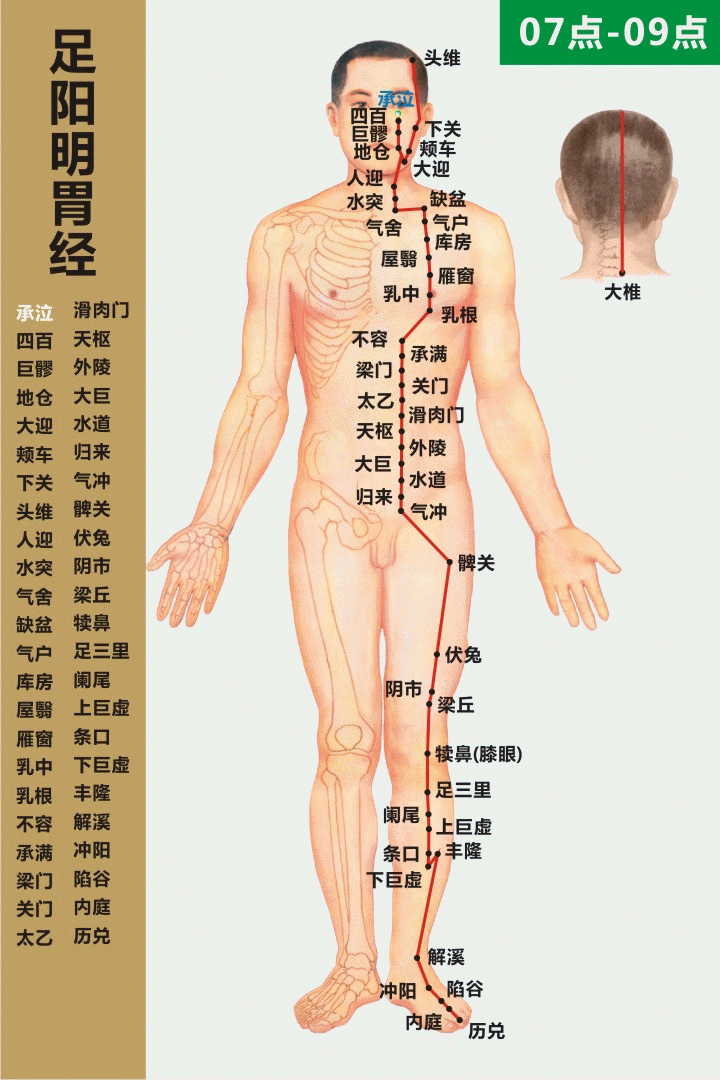
Yin time (7 AM to 9 AM) — Stomach Meridian is strong. During this time, breakfast is best for nourishing the body; it is easiest to digest and absorb. Breakfast should include gentle, stomach-nourishing foods such as porridge, oatmeal, and buns. Overly dry or hot foods can lead to stomach fire, causing dry lips and sores. Skipping breakfast can lead to various diseases.
Excess symptoms: Spleen and stomach disharmony, poor digestion and absorption, bloating, belching, headaches, fatigue, joint abnormalities, and abnormal bowel movements.
Health tip: It is important to have breakfast at this time. If you do not provide food, the stomach will continue to secrete acid. Prolonged hunger can lead to ulcers, gastritis, duodenitis, and cholecystitis! Massaging the Stomach Meridian one hour after meals can help regulate gastrointestinal function.

04
[Foot Taiyin Spleen Meridian]
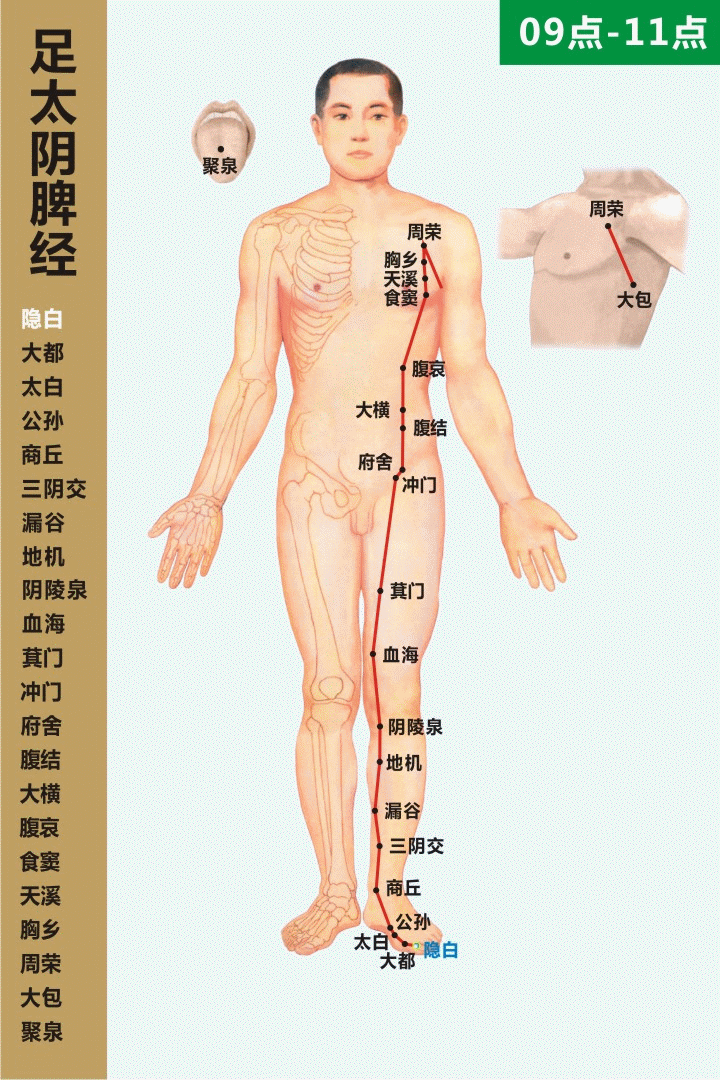
Yin time (9 AM to 11 AM) — Spleen Meridian is strong. During this time, the Spleen Meridian is active, producing blood for the body; “the spleen governs transportation and transformation, and it controls blood.” The spleen is the master of digestion, absorption, and excretion, and it is also the leader of blood in the body. “The spleen opens to the mouth, and its manifestation is in the lips.” When the spleen functions well, digestion and absorption are good, and blood quality is high, resulting in rosy lips. Pale lips indicate insufficient blood energy, while dark or purple lips indicate cold entering the Spleen Meridian.
Health tip:Disharmony between the spleen and stomach can lead to poor digestion and absorption, and spleen deficiency can cause memory decline. This time is ideal for activating the Spleen Meridian, and it is best to have lunch. If possible, prepare meals at home with choices like lentils, sweet potatoes, potatoes, tofu, celery, corn, and rice. Fruits can include apples, oranges, lemons, and tangerines. Recommended beverages include green tea, herbal tea, and honey water.

05
[Hand Shaoyin Heart Meridian]
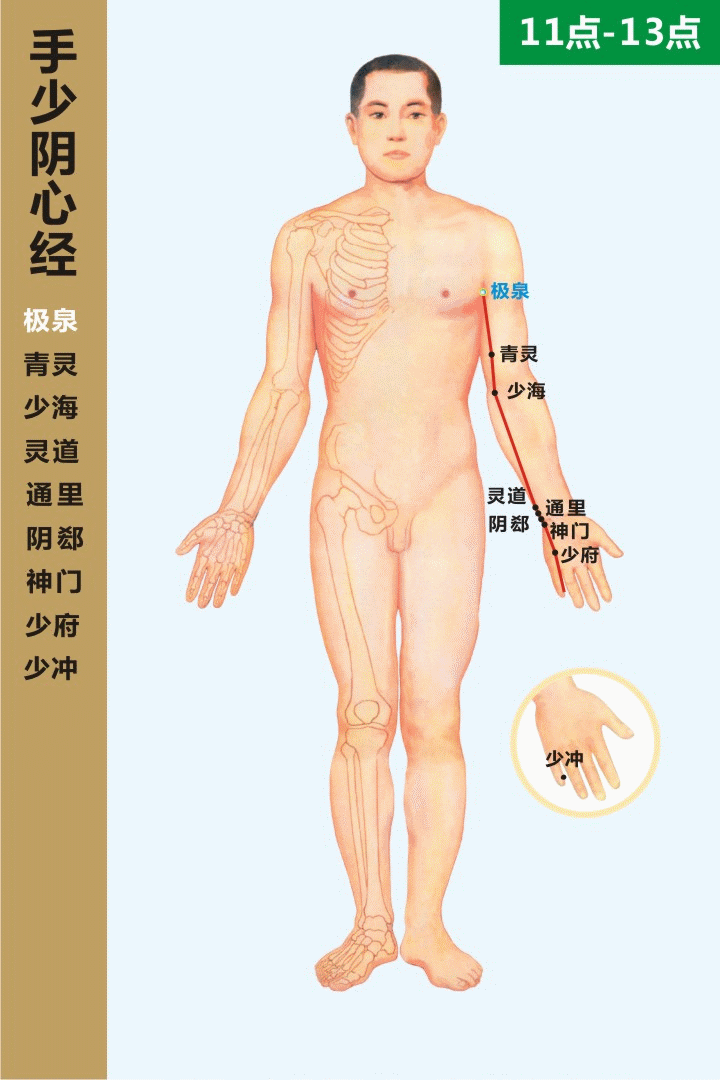
Yin time (11 AM to 1 PM) — Heart Meridian is strong. During this time, a short rest can calm the mind and nourish energy; “the heart governs the spirit, opens to the tongue, and its manifestation is in the face.” Heart Qi promotes blood circulation, nourishes the spirit, energy, and tendons. A short nap during this time is very beneficial for heart health, allowing one to be energetic from afternoon to evening.

06
[Hand Taiyang Small Intestine Meridian]
Yin time (1 PM to 3 PM) — Small Intestine Meridian is strong. During this time, the small intestine separates clear from turbid, and drinking water can reduce heat; the small intestine separates clear from turbid, sending fluids to the bladder and waste to the large intestine, while the essence is sent to the spleen. The Small Intestine Meridian adjusts the nutrition of the body throughout the day. If there is heat in the small intestine, one may experience dry cough and flatulence. Drinking more water and tea is beneficial for the small intestine to reduce heat.

07
[Foot Taiyang Bladder Meridian]
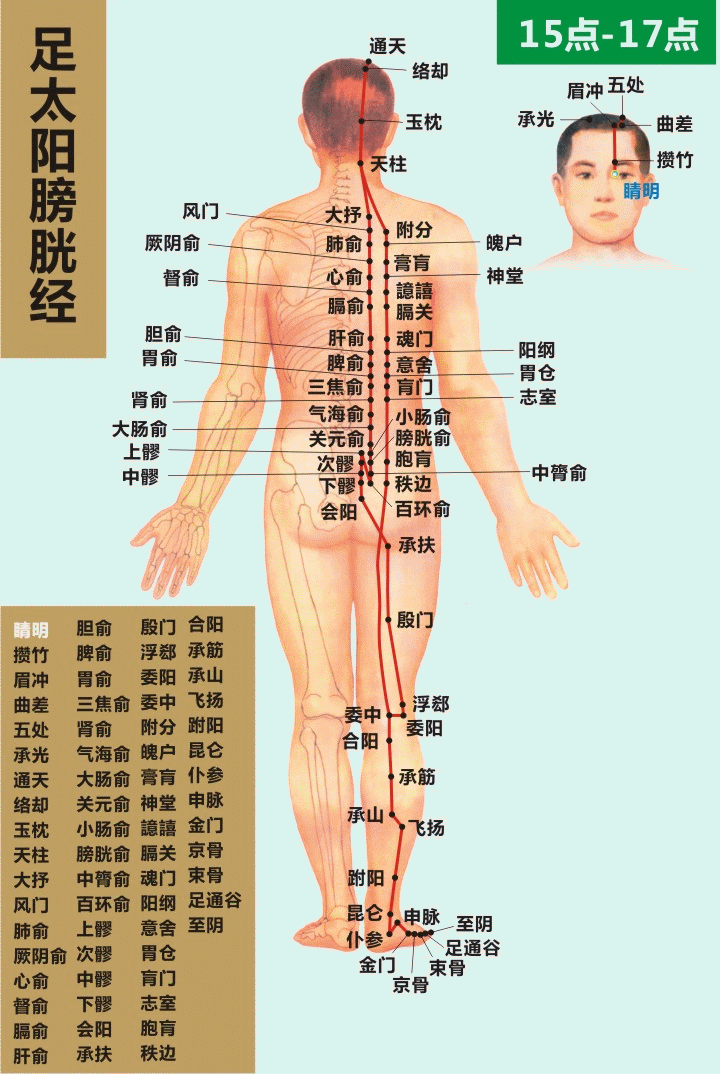
Yin time (3 PM to 5 PM) — Bladder Meridian is strong. During this time, body fluids are abundant, nourishing Yin and promoting comfort; the bladder stores water and fluids, expelling them from the body, while fluids circulate within. If there is heat in the bladder, it can cause bladder cough and urinary incontinence. The body temperature is higher during this time, and those with Yin deficiency may feel particularly pronounced symptoms. Appropriate activity helps circulate body fluids, and drinking teas that nourish Yin and clear heat is most effective for those with Yin deficiency.

08
[Foot Shaoyin Kidney Meridian]
Yin time (5 PM to 7 PM) — Kidney Meridian is strong. During this time, the kidneys store essence and absorb vital energy; “the kidneys store reproductive essence and the essence of the five zang and six fu organs. The kidneys are the root of congenital energy.” After the body expels heat and toxins during the previous time, the kidneys enter a phase of storing essence. It is not suitable for intense exercise or excessive water intake at this time.

09
[Hand Jueyin Pericardium Meridian]
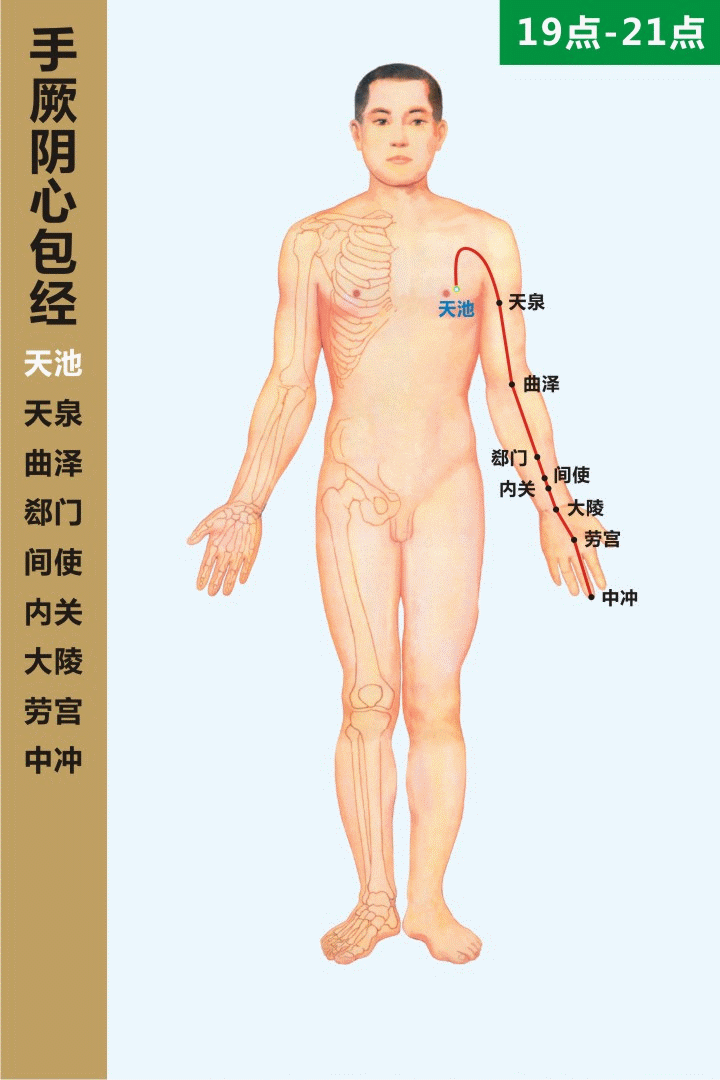
Yin time (7 PM to 9 PM) — Pericardium Meridian is strong. During this time, protect the heart and relieve stress; “the pericardium is the outer membrane of the heart, with vessels attached, serving as a pathway for Qi and blood. Evil cannot reside here, as it harms the heart.” The pericardium protects the heart and serves as a pathway for Qi and blood. The Pericardium Meridian is most active at this time, clearing external evils from around the heart, keeping it in a healthy state. It is essential to maintain a pleasant mood: read, listen to music, do spa treatments, dance, or practice Tai Chi to relax and relieve stress.

10
[Hand Shaoyang San Jiao Meridian]
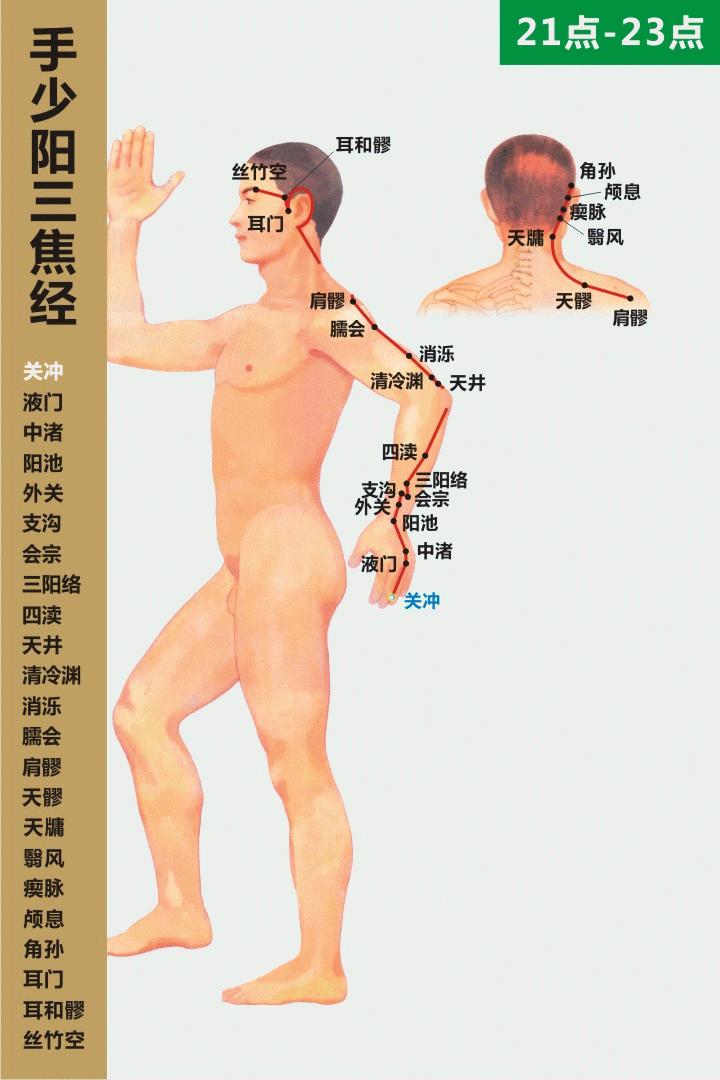
Yin time (9 PM to 11 PM) — San Jiao Meridian is strong. During this time, the hundred vessels are unobstructed, nourishing the body and enhancing beauty; the San Jiao is the largest of the six fu organs, responsible for managing Qi and clearing water pathways. At this time, the San Jiao can open the hundred vessels. If a person sleeps during this time, the hundred vessels can receive the best rest, which is very beneficial for the body and beauty. Centenarians often share the common trait of sleeping during this time. If modern people do not wish to sleep at this time, they can listen to music, read, watch TV, or practice yoga, but it is best not to stay awake past this time.

11
[Foot Shaoyang Gallbladder Meridian]
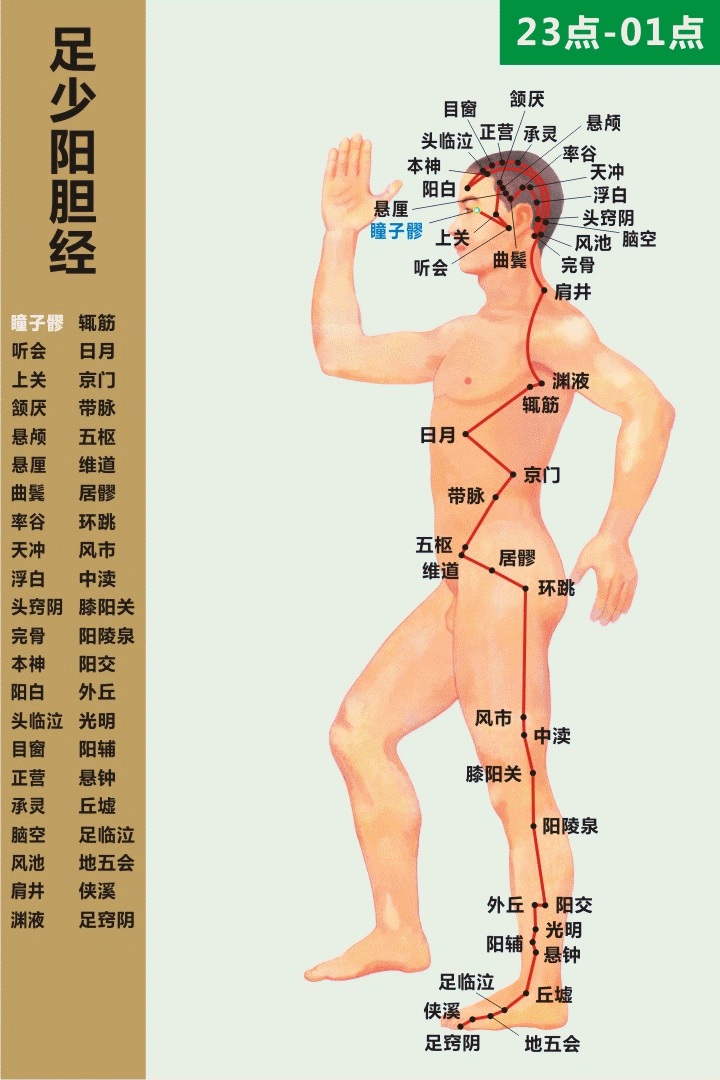
Yin time (11 PM to 1 AM) — Gallbladder Meridian is strong. During this time, sleeping well prevents dark circles; TCM theory states, “the excess Qi of the liver is released into the gallbladder, where it is concentrated and refined.” If a person sleeps before this time, the gallbladder can complete its metabolism. “The clearer the bile, the clearer the mind.” Those who sleep before this time wake up with a clear mind and rosy complexion, without dark circles. Conversely, those who cannot sleep before this time may have a pale complexion and dark circles, as poor bile metabolism can lead to crystallization and stones.

12
[Foot Jueyin Liver Meridian]
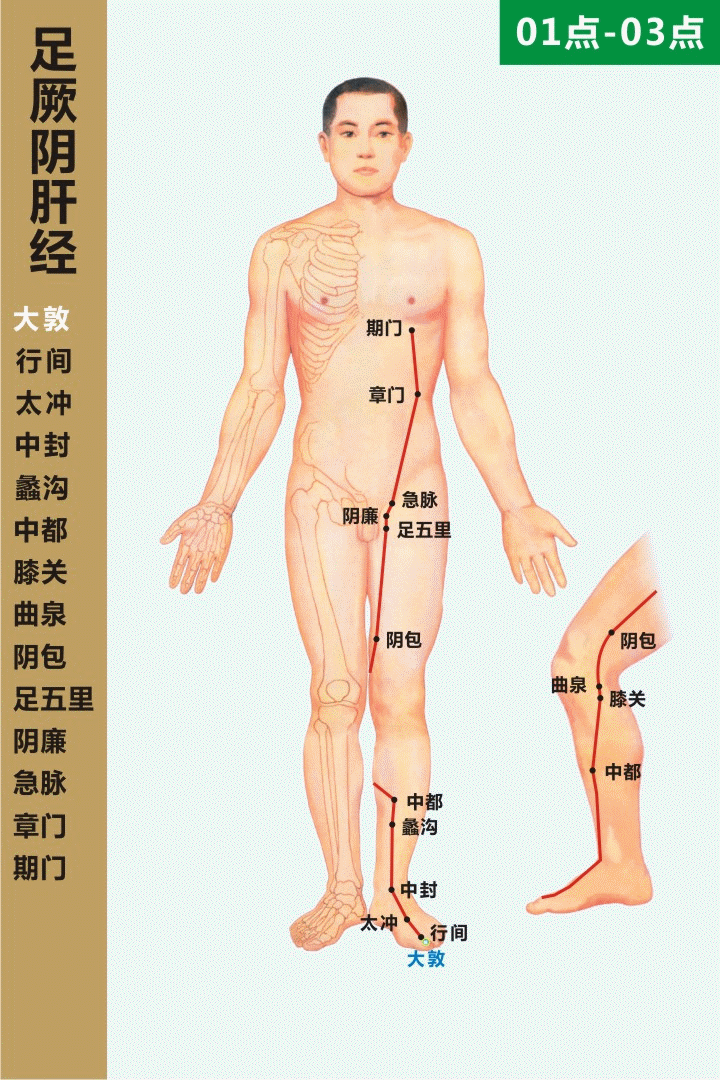
Yin time (1 AM to 3 AM) — Liver Meridian is strong. If one does not sleep during this time, spots may appear on the face; TCM theory states, “the liver stores blood.” “When a person sleeps, blood returns to the liver.” If one cannot sleep before this time, the liver continues to output energy to support thinking and action, failing to complete metabolism. Therefore, those who cannot sleep before this time may have a grayish complexion, sluggish emotions, and are prone to liver disease, with a dull complexion and spots.
Health tip:At this time, the body requires a lot of oxygen, so deep breathing is necessary, requiring deeper sleep. If you wake up coughing, it is best to drink a cup of warm water to relieve it and alleviate lung dryness. Recommended foods include: cabbage, pears, tofu, soy milk, and milk.
Excess symptoms:Decreased skin immunity, cold hands and feet, numbness, dry throat, and cough.
Deficiency symptoms:Difficulty breathing, throat abnormalities, chest tightness, wheezing, tonsillitis, cough, shoulder and back pain, and susceptibility to hemorrhoids.


-END-
 Qian Yi Jiu, Protecting Your Health and Life(“Song Ge Talks About Health“ Focus on Health Preservation Knowledge)Spring nourishes the liver, summer nourishes the heart, and spring enhances immunity; moxibustion can energize. “Balance and Protection Set” is here to safeguard your health.
Qian Yi Jiu, Protecting Your Health and Life(“Song Ge Talks About Health“ Focus on Health Preservation Knowledge)Spring nourishes the liver, summer nourishes the heart, and spring enhances immunity; moxibustion can energize. “Balance and Protection Set” is here to safeguard your health.
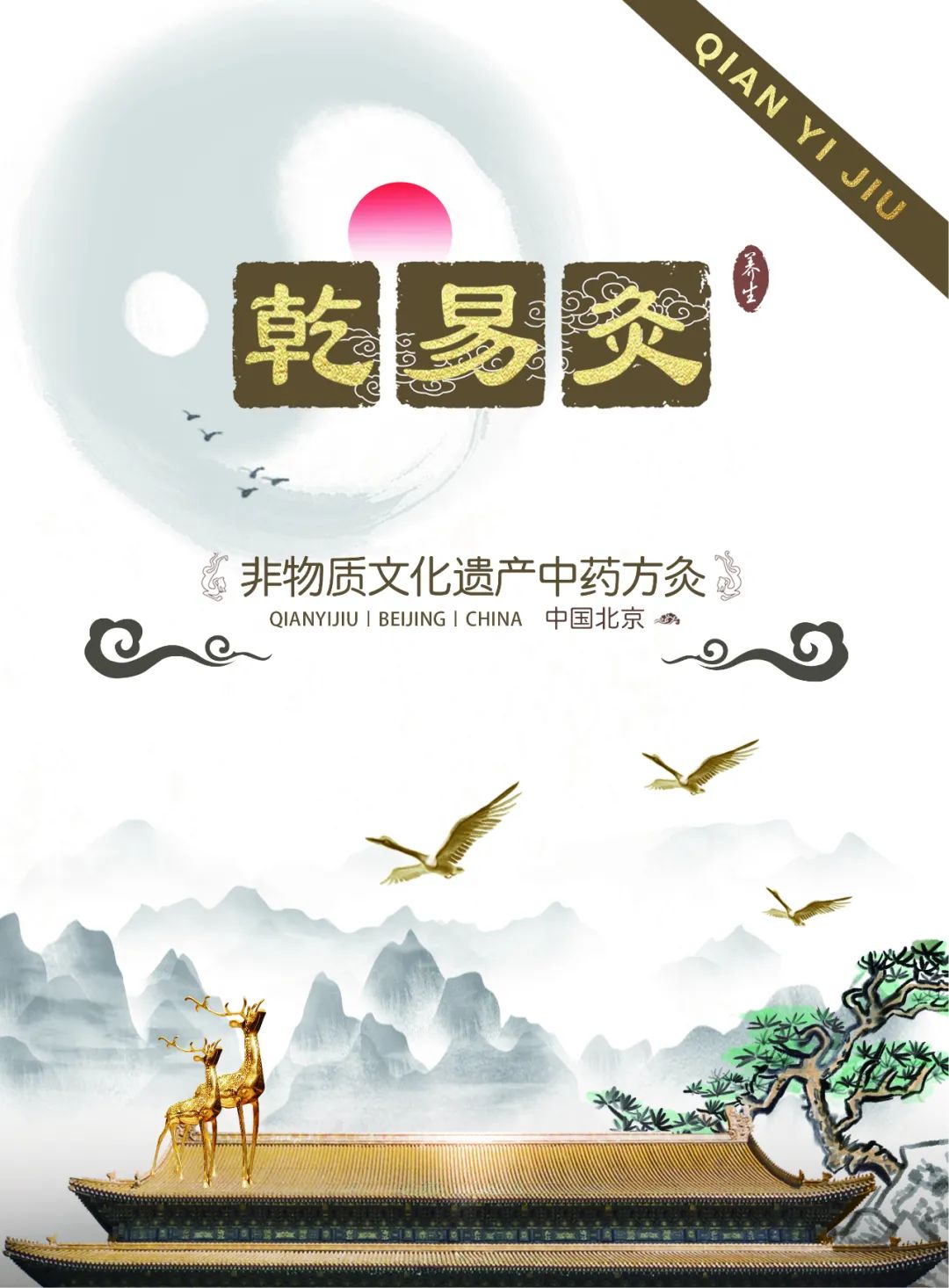
If you like it, please like, follow, and share with your friends!~
